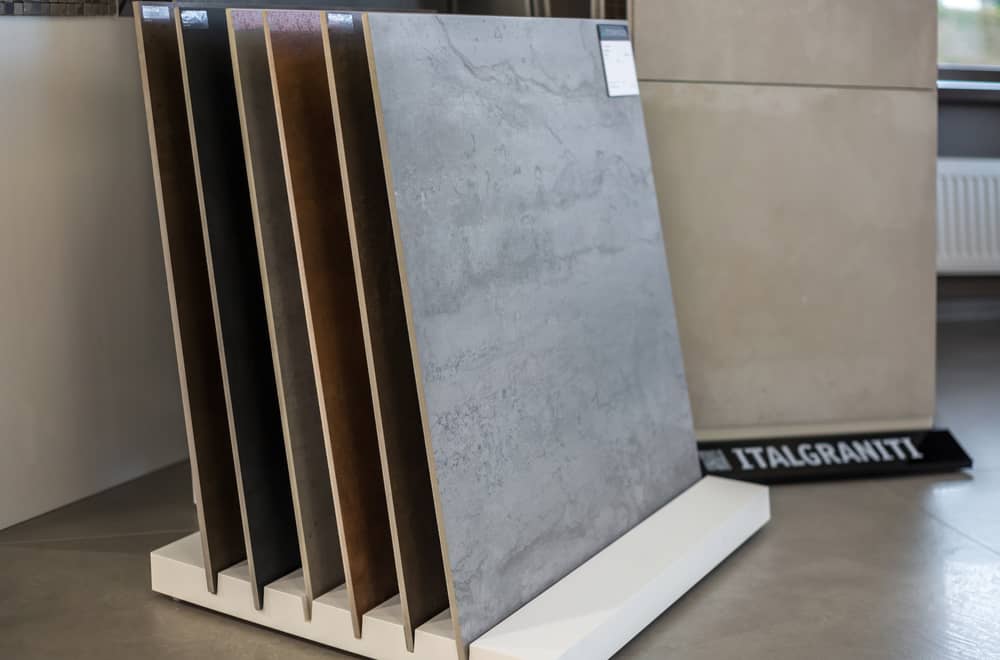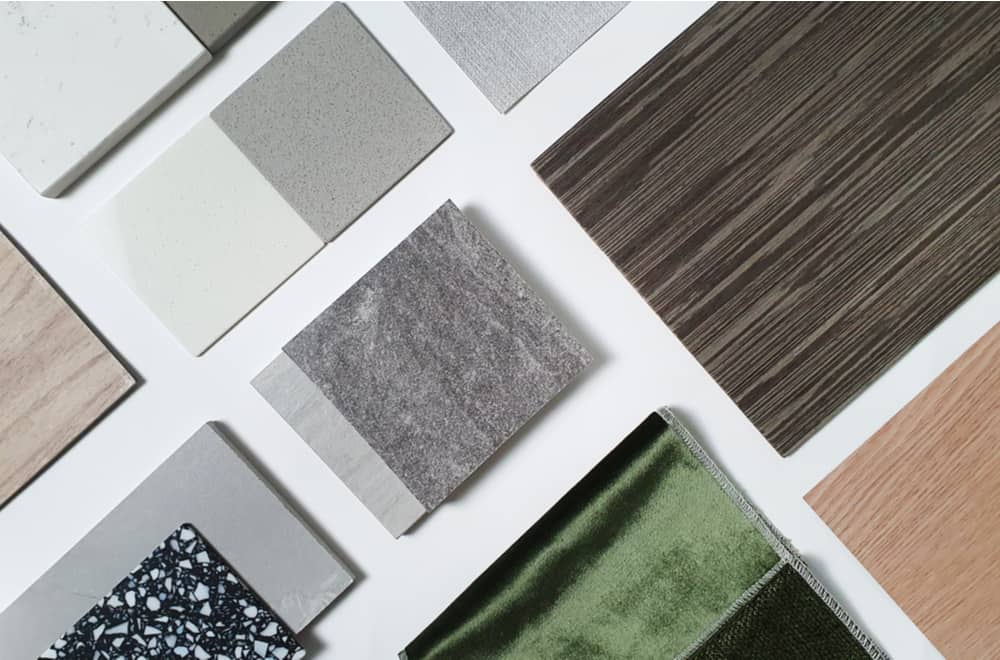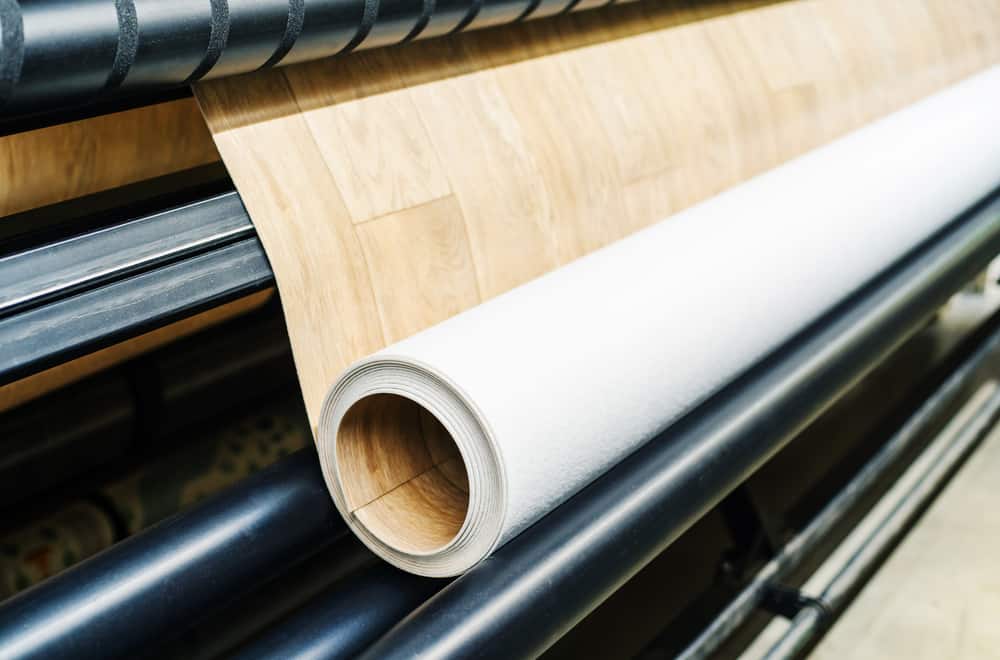Are you in the market for new flooring? Vinyl has become a popular choice among homeowners looking for innovative, high-quality, and low-maintenance floors. But, as you will quickly find out, the sheer number of options can be overwhelming.
The most common vinyl flooring choices are luxury vinyl tiles, vinyl composite tiles, and vinyl sheet flooring. This article will explain everything you need to know about LVT vs. VCT vs. vinyl sheet flooring.
I wrote this guide based on my experience shopping for and comparing the different vinyl flooring options. So, keep reading to find out what the best flooring types are for your needs.
Table of Contents
What Is Luxury Vinyl Tile(LVT)?
Not to be confused with linoleum flooring, luxury vinyl tile (LVT) is an innovative, hardwearing, and aesthetically attractive flooring option. It mimics popular flooring products such as wood, stone, and ceramic.
LVT is made of polyvinyl chloride and other composite materials and consists of at least five layers that add to its functionality, durability, and design. The layers are:
- An adhering backing at the bottom of the tile
- A core layer made of polyvinyl chloride
- A print film layer on which the flooring’s design is printed
- The wear layer, a clear layer that protects the print film and adds depth to the design
- An upper polyurethane coating
There can be more layers depending on the additional material the tiles are made to mimic, for example, stone or ceramic tiles.
Pros of Luxury Vinyl Tiles
Let’s take a look at some advantages of LVT flooring.
- Hardwearing
The protective wear layer gives LVT its hardwearing quality and allows this flooring to last for years without fading or significant wear and tear. LVT ranges between 6 and 10 millimeters in thickness, making this product resistant to moisture, dings, dents, tears, gouges, and tears.
The upfront costs of buying and installing LVT might be comparably higher. But, you will be rewarded with excellent lifetime value given that the product is resistant to damage and requires very little maintenance compared to real wood or stone.
- Many Design Options
LVT is a top choice if you want a flooring product that gives you variety in design, texture, pattern, and color. These vinyl tiles can replicate wood, natural stone, ceramic tile, bamboo, cement, animal print, and many artistic styles. Better still, you can grout the tiles, giving your floors an extremely realistic and appealing look.
Luxury vinyl tiles are perfect if you are keen on bringing your home together with different floor patterns and enjoying a high-end look without stretching your budget thin.
- Low maintenance
LVT can serve you for many years without needing major repairs, giving you a great return on investment. Any damaged tile can be replaced individually without affecting the adjacent pieces.
Day-to-day maintenance involves the usual vacuuming. Depending on how busy your home is, you can mop the floors every other day.
Cons of Luxury Vinyl Tile
- Non-biodegradable
LVT is made using non-biodegradable material, a factor to consider when choosing the best vinyl flooring for your home. On the upside, LVT requires very little maintenance and lasts for years, allowing you to reduce your carbon footprint.
- Subfloor preparation
Luxury vinyl tiles are installed by adhering the product to the subfloor using a specially formulated adhesive. Depending on the nature of the subfloor, you might have to remove dents, level it, and perhaps install a plywood underlayment. You might incur some extra costs, but you will enjoy smooth, good-looking floors.
What Is Vinyl Composite Tile(VCT)?
Also known as vinyl composition tile, this flooring product is commonly used in high-traffic commercial settings such as hospitals, stores, institutions of higher learning, etc., due to its versatility and durability.
Vinyl composite tile (VCT) contains a small amount of vinyl mixed with natural limestone, plasticizers, resins, thermoplastic binders, and color pigments. Tiles come in different shapes, styles, and sizes, but most measure 12 inches by 12 inches, 1/8 inches thick, and weigh approximately 1 pound.
Like LVT, vinyl composition tiles can also mimic common flooring materials such as terrazzo, ceramic tiles, natural stone, and wood. Thanks to advances in digital graphic technology, vinyl tiles are available in many colors and patterns, making them suitable for use in many commercial and residential settings.
Like other flooring products, VCT has its pros and cons.
Pros Of Vinyl Composite Tile
Below are some advantages of vinyl composite tiles.
- Durable
The layered structure of VCT plus the materials used make this flooring product make it resistant to moisture and wear and tear. Vinyl tiles are adequately thick, adjust well to pressure, and can support a significant amount of weight without buckling or breaking. Their impressive durability makes them the ideal choice for high-traffic spaces.
- Low-cost option
Compared to mainstream flooring products such as wood, ceramic, and stone, VCT is friendlier to the pocket. It is also slightly less expensive than vinyl flooring options such as LVT. VCT is a good choice if you are looking for a versatile, durable, and affordable vinyl flooring product.
- Wide variety of patterns and style
Whether used in a residential or commercial setting, VCT is sure to improve the room’s overall ambiance. While subdued neutral-colored vinyl tiles are available, there is also a wide choice of brightly colored, vibrant, and artistic tiles. There is no limit to the design and floor patterns you can create using these tiles.
- Quiet and environment-friendly
If you have ever walked on ceramic, stone, or wood floors, you know how noisy they can be. Ideally, a good floor should be noiseless or at least have a low noise level, especially when used in indoor spaces. If a silent floor is a priority, VCT is an excellent choice. Aside from this, composition tiles are biodegradable and recyclable, making them a good option for the environmentally-conscious consumer.
Cons Of Vinyl Composite Tile
Vinyl composite flooring has a few downsides.
- High maintenance
Vinyl composite tiles are made of porous materials. Although this product is moisture resistant, continued exposure to moisture can weaken the substrate, allowing moisture to seep through.
Regular waxing and sealing are necessary to retain the tile’s moisture resistance. After a few years, VCT tiles need to be stripped, waxed, and resealed to keep the floor in top condition, which can bump up the maintenance costs.
In addition, depending on the state of your subfloor, you will need to budget for leveling the subfloor and installing a plywood substrate.
- Difficult to remove
The biggest downside of VCT is that it can be quite effort-intensive to remove. If you need to replace several damaged tiles, be prepared to use various methods to unglue the tiles from the subfloor.
What is Vinyl Sheet Flooring?
Vinyl sheet flooring is a recent flooring product coming in the form of large PVC sheet rolls. The sheet consists of a plastic core attached to a foam or felt backing on the underside. A design layer is printed on the top side of the sheet, and a resistant wear layer seals the design layer.
There are two ways to install sheet vinyl: full-spread adhesive and loose lay. The full-spread method is more permanent as it involves spreading an adhesive on the subfloor before installing the sheet vinyl. The loose lay method doesn’t involve using adhesive, and the sheet is just laid down and cut in place but may be held down using double-sided tape along the room’s perimeter.
Let’s now take a look at the pros and cons of vinyl sheet flooring.
Pros Of Vinyl Sheet Flooring
Sheet vinyl flooring offers the following advantages.
- Durability
Many manufacturers offer a 25 year to a lifetime warranty on their vinyl sheet products. That tells you the flooring is built to serve you for a long time. It is especially well-suited to high traffic areas such as the kitchen and bathroom. There are different types and qualities of vinyl sheet flooring. Opt for wear, stain, and scratch-resistant products as these will serve you for longer without showing signs of aging.
- Comfort
Sheet vinyl has a felt or fiberglass backing, which gives your floor a softer feel underfoot. Other flooring options such as ceramic tiles, stone, and hardwood have no cushioning and can be uncomfortable to stand on for long periods.
Some vinyl sheet brands have additional cushioning for extra comfort. You can also install this flooring product on top of water-based heating systems, providing additional comfort for your feet.
- Low maintenance
When choosing flooring products, you want one that is easy to clean. Vinyl flooring sheets are laid down whole with little to no cutting, and no grout is used. The floor is stain and scratch-resistant; regular vacuuming and occasional mopping are all you need to keep your floors in tip-top condition. If you have pets or young kids, vinyl sheet flooring is a great option as it can take prolonged abuse and is easy to keep clean.
Cons Of Vinyl Sheet Flooring
Vinyl sheet flooring has a few downsides.
- Installation difficulties
Vinyl sheet flooring comes in large rolls, making it difficult to cut to size and install. That said, if you have some DIY flooring experience and an extra pair of helping hands, you can successfully install vinyl sheets.
- Difficult to make repairs
You can easily replace damaged composite tiles or luxury vinyl tiles, but this is not the case for vinyl sheet flooring. You can cut and try to replace a damaged portion, but the difference in aesthetics will be noticeable.
Bottom Line: LVT vs. VCT vs. Vinyl Sheet Flooring
Vinyl flooring has come a long way, and today it is among the most popular options for residential and commercial floors. As you can see from our LVT vs. VCT vs. vinyl sheet flooring comparison, each product has strong advantages and, of course, some downsides to consider.
If you are looking for a product with more design options that closely mimic hardwood floors, luxury vinyl tile is a good choice. Vinyl composite tile is pocket-friendly and is a great alternative if you are on a budget; you will enjoy all the perks of luxury vinyl flooring while keeping some money in your pocket.
LVT and VCT are hardwearing, but the seams between planks or tiles can gradually let in water. For this reason, vinyl sheet, which has a seamless installation, is the best for water-prone areas such as the kitchen, bathroom, and mudroom.
When shopping for vinyl flooring, consider your family’s needs, especially if you are a busy household. Budget, cost of installation, maintenance, and availability of design options will also influence your choice.


